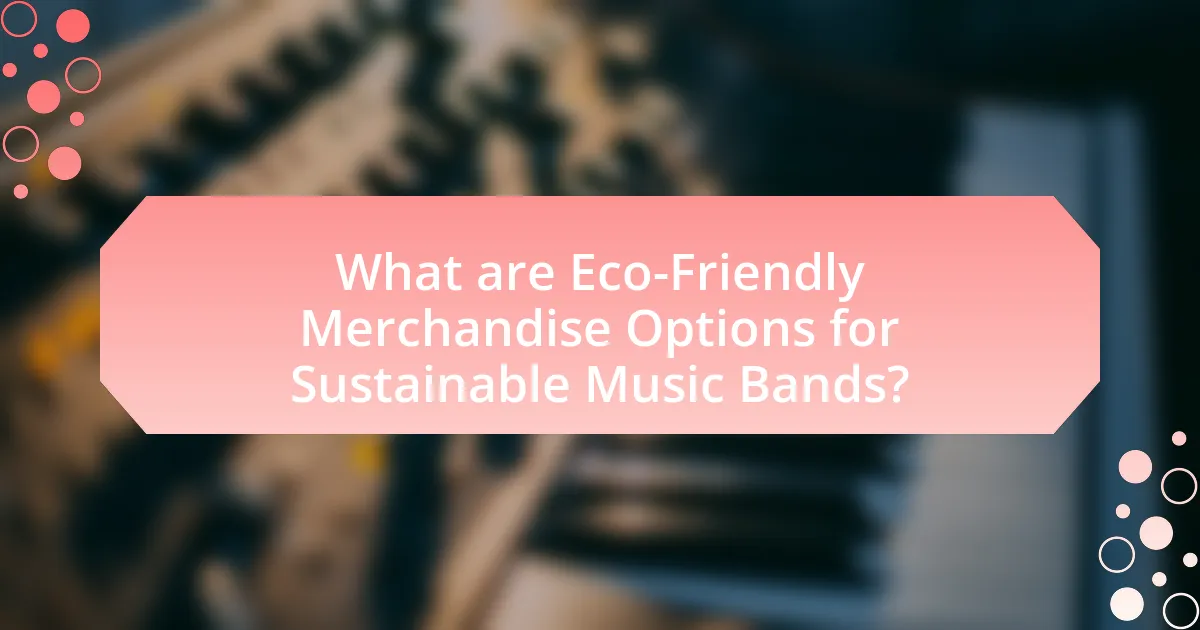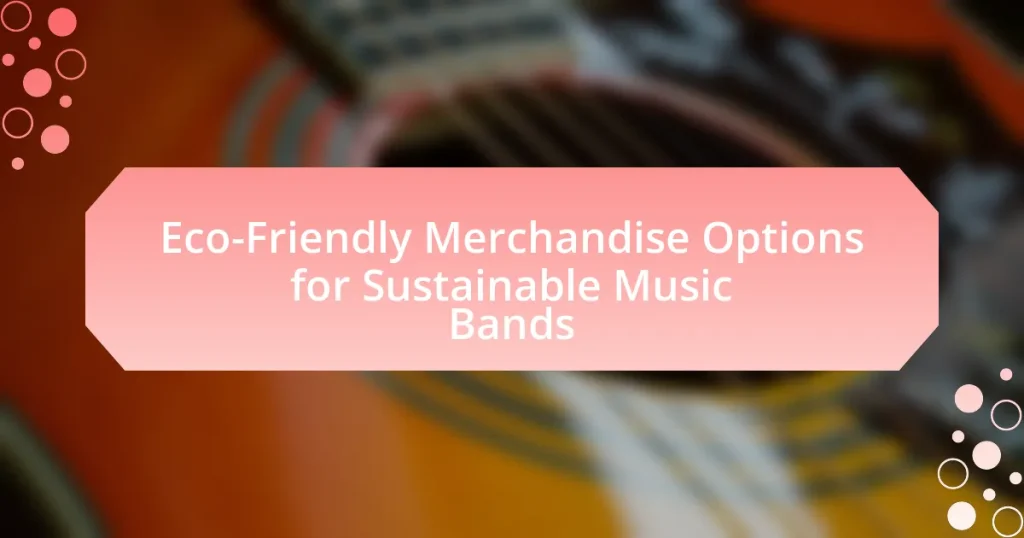Eco-friendly merchandise options for sustainable music bands encompass a range of products designed to minimize environmental impact, including organic cotton apparel, recycled materials, biodegradable phone cases, and digital downloads. The article highlights the importance of adopting eco-friendly merchandise to reduce waste and pollution, appealing to a growing consumer base that values sustainability. It discusses the environmental impacts of traditional merchandise, the benefits of sustainable materials, and strategies for bands to implement eco-friendly practices effectively. Additionally, the article addresses challenges bands may face in sourcing sustainable products and emphasizes the role of fan engagement in promoting these initiatives.

What are Eco-Friendly Merchandise Options for Sustainable Music Bands?
Eco-friendly merchandise options for sustainable music bands include organic cotton apparel, recycled materials for products like tote bags and water bottles, biodegradable phone cases, and digital downloads instead of physical CDs. Organic cotton apparel reduces pesticide use and promotes sustainable farming practices, while recycled materials help minimize waste. Biodegradable phone cases decompose naturally, reducing plastic pollution. Digital downloads eliminate the need for physical production, significantly lowering the carbon footprint associated with music distribution. These options not only align with environmental sustainability but also appeal to eco-conscious consumers, enhancing the band’s brand image.
Why should music bands consider eco-friendly merchandise?
Music bands should consider eco-friendly merchandise to reduce their environmental impact and appeal to a growing audience that values sustainability. Eco-friendly products, such as organic cotton t-shirts or biodegradable items, minimize waste and pollution, aligning with global efforts to combat climate change. Research indicates that 66% of consumers are willing to pay more for sustainable brands, highlighting the market potential for bands that adopt eco-friendly practices. By choosing sustainable merchandise, bands not only contribute positively to the environment but also enhance their brand image and connect with environmentally conscious fans.
What environmental impacts do traditional merchandise options have?
Traditional merchandise options have significant environmental impacts, primarily due to resource extraction, production processes, and waste generation. The production of items like clothing and accessories often involves the use of non-renewable resources, such as petroleum for synthetic fabrics, which contributes to greenhouse gas emissions. Additionally, the dyeing and finishing processes can pollute water sources with toxic chemicals. According to the Ellen MacArthur Foundation, the fashion industry alone is responsible for 10% of global carbon emissions, highlighting the substantial ecological footprint of traditional merchandise. Furthermore, many products end up in landfills, where they can take years to decompose, exacerbating waste management issues.
How can eco-friendly merchandise enhance a band’s image?
Eco-friendly merchandise can enhance a band’s image by aligning the band with sustainability values, which resonate with environmentally conscious fans. This alignment not only attracts a dedicated audience but also fosters a positive reputation, as studies show that 66% of consumers are willing to pay more for sustainable products. By offering eco-friendly items, bands demonstrate social responsibility, which can lead to increased loyalty and support from fans who prioritize environmental issues. Additionally, bands that adopt sustainable practices can differentiate themselves in a crowded market, appealing to a growing demographic that values ethical consumption.
What types of eco-friendly merchandise are available for music bands?
Eco-friendly merchandise available for music bands includes items such as organic cotton t-shirts, recycled paper posters, biodegradable phone cases, and reusable water bottles. These products are designed to minimize environmental impact while promoting the band’s brand. For instance, organic cotton t-shirts reduce pesticide use and water consumption compared to conventional cotton, while recycled paper posters help decrease waste and promote sustainability. Additionally, biodegradable phone cases break down naturally, and reusable water bottles encourage reduced plastic usage. These options not only appeal to environmentally conscious fans but also align with the growing trend of sustainability in the music industry.
What materials are commonly used in sustainable merchandise?
Sustainable merchandise commonly utilizes materials such as organic cotton, recycled polyester, bamboo, and hemp. Organic cotton is grown without synthetic pesticides or fertilizers, reducing environmental impact. Recycled polyester, made from post-consumer plastic bottles, diverts waste from landfills and decreases reliance on virgin materials. Bamboo is a fast-growing plant that requires minimal water and no pesticides, making it an eco-friendly choice. Hemp is a durable fiber that grows quickly and enriches the soil, further promoting sustainability. These materials collectively contribute to reducing the carbon footprint and promoting eco-friendly practices in merchandise production.
How do different merchandise types compare in terms of sustainability?
Different merchandise types vary significantly in terms of sustainability, with organic cotton apparel generally being the most eco-friendly option, followed by recycled materials and conventional products. Organic cotton uses no synthetic pesticides or fertilizers, reducing environmental impact, while recycled materials, such as recycled polyester, help divert waste from landfills and decrease resource consumption. In contrast, conventional merchandise often relies on non-renewable resources and harmful chemicals, contributing to pollution and resource depletion. For instance, a study by the Textile Exchange found that organic cotton farming can reduce water usage by up to 91% compared to conventional cotton farming, highlighting the sustainability benefits of choosing eco-friendly merchandise.
How can music bands effectively implement eco-friendly merchandise strategies?
Music bands can effectively implement eco-friendly merchandise strategies by prioritizing sustainable materials and ethical production processes. For instance, bands can choose organic cotton, recycled plastics, or biodegradable materials for their apparel and merchandise, which reduces environmental impact. Additionally, partnering with certified eco-friendly manufacturers ensures that the production process adheres to sustainable practices, such as minimizing waste and using renewable energy sources. Research indicates that consumers are increasingly supportive of brands that demonstrate environmental responsibility, with a 2021 survey showing that 66% of global consumers are willing to pay more for sustainable brands. This alignment not only enhances the band’s image but also fosters a loyal fan base committed to sustainability.
What steps should bands take to source sustainable products?
Bands should prioritize sourcing sustainable products by conducting thorough research on suppliers, selecting materials with low environmental impact, and ensuring ethical production practices. Researching suppliers involves evaluating their sustainability certifications, such as Fair Trade or Global Organic Textile Standard, which indicate adherence to eco-friendly practices. Choosing materials like organic cotton, recycled polyester, or biodegradable options reduces the ecological footprint of merchandise. Additionally, bands should verify that production processes are ethical, ensuring fair labor practices and minimal waste. These steps collectively contribute to a more sustainable merchandise strategy, aligning with the growing consumer demand for eco-friendly products in the music industry.
How can bands promote their eco-friendly merchandise to fans?
Bands can promote their eco-friendly merchandise to fans by leveraging social media platforms to showcase the sustainability of their products. By sharing engaging content that highlights the environmental benefits of their merchandise, such as using organic materials or supporting fair trade practices, bands can effectively reach their audience. For instance, a study by the Nielsen Global Sustainability Report indicates that 66% of consumers are willing to pay more for sustainable brands, demonstrating a market demand for eco-friendly products. Additionally, bands can collaborate with eco-conscious influencers to amplify their message and create a community around sustainability, further enhancing their promotional efforts.
What challenges do music bands face when adopting eco-friendly merchandise?
Music bands face several challenges when adopting eco-friendly merchandise, primarily related to cost, supply chain limitations, and consumer demand. The production of eco-friendly items often incurs higher costs due to sustainable materials and ethical manufacturing processes, which can strain a band’s budget. Additionally, sourcing these materials can be difficult, as not all suppliers offer eco-friendly options, leading to potential delays and limited product variety. Furthermore, consumer demand for eco-friendly merchandise may not always align with traditional merchandise preferences, making it challenging for bands to gauge market interest and ensure sales. These factors collectively hinder the seamless integration of eco-friendly merchandise into a band’s offerings.
How can bands overcome financial barriers to sustainable merchandise?
Bands can overcome financial barriers to sustainable merchandise by leveraging partnerships with eco-friendly suppliers and utilizing crowdfunding platforms. Collaborating with suppliers who prioritize sustainability can reduce costs through bulk purchasing and shared marketing efforts. For instance, bands can negotiate lower prices for organic materials or recycled products, which can lead to significant savings. Additionally, crowdfunding platforms like Kickstarter or Indiegogo allow bands to pre-sell merchandise, generating upfront capital to cover production costs. This approach not only secures funding but also engages fans in the sustainability mission, creating a community around eco-friendly practices.
What logistical issues might arise in sourcing eco-friendly products?
Sourcing eco-friendly products can lead to logistical issues such as limited availability, higher costs, and complex supply chains. Limited availability arises because eco-friendly materials may not be produced in sufficient quantities, making it difficult for suppliers to meet demand. Higher costs are often associated with sustainable sourcing, as eco-friendly materials can be more expensive due to their production processes and sourcing practices. Additionally, complex supply chains can complicate the logistics of sourcing, as they may involve multiple suppliers and require adherence to specific environmental standards, which can lead to delays and increased management efforts. These factors collectively challenge the efficient sourcing of eco-friendly products for sustainable music bands.
How can eco-friendly merchandise contribute to a band’s overall sustainability goals?
Eco-friendly merchandise can significantly contribute to a band’s overall sustainability goals by reducing environmental impact and promoting responsible consumption. By utilizing sustainable materials and ethical production processes, bands can minimize waste and carbon emissions associated with traditional merchandise manufacturing. For instance, using organic cotton or recycled materials for apparel decreases reliance on harmful pesticides and reduces landfill contributions. Additionally, eco-friendly merchandise often appeals to environmentally conscious fans, fostering a community that values sustainability, which can enhance the band’s brand image and loyalty. This alignment with sustainability can also lead to increased sales, as consumers are increasingly seeking products that reflect their values.
What role does fan engagement play in promoting sustainability?
Fan engagement plays a crucial role in promoting sustainability by fostering a community that prioritizes eco-friendly practices. Engaged fans are more likely to support sustainable initiatives, such as purchasing eco-friendly merchandise, which can lead to increased demand for sustainable products. For instance, a study by the University of California found that 70% of consumers are willing to pay more for sustainable products when they feel a connection to the brand or artist. This connection drives artists and bands to adopt sustainable practices, knowing that their fan base values and supports these efforts. Thus, fan engagement not only enhances the visibility of sustainability initiatives but also directly influences the market for eco-friendly merchandise.
How can bands measure the impact of their eco-friendly merchandise initiatives?
Bands can measure the impact of their eco-friendly merchandise initiatives by tracking sales data, customer feedback, and environmental metrics. Analyzing sales data allows bands to assess the financial performance of eco-friendly products compared to traditional merchandise, providing insight into consumer preferences. Gathering customer feedback through surveys can reveal perceptions of the merchandise’s sustainability and influence on purchasing decisions. Additionally, measuring environmental metrics, such as the reduction in carbon footprint or waste generated from the production of eco-friendly items, offers concrete evidence of the initiatives’ ecological benefits. For instance, a study by the Carbon Trust found that companies adopting sustainable practices can reduce their carbon emissions by up to 30%, demonstrating the potential positive impact of eco-friendly merchandise.
What are best practices for music bands in choosing eco-friendly merchandise?
Music bands should prioritize sustainable materials, ethical sourcing, and minimal packaging when choosing eco-friendly merchandise. Utilizing organic cotton, recycled materials, and biodegradable options reduces environmental impact. Additionally, partnering with suppliers who adhere to fair labor practices ensures ethical production. Research indicates that consumers are increasingly supportive of brands that demonstrate environmental responsibility, with 66% of global consumers willing to pay more for sustainable goods. By implementing these best practices, music bands can effectively contribute to sustainability while appealing to eco-conscious fans.


